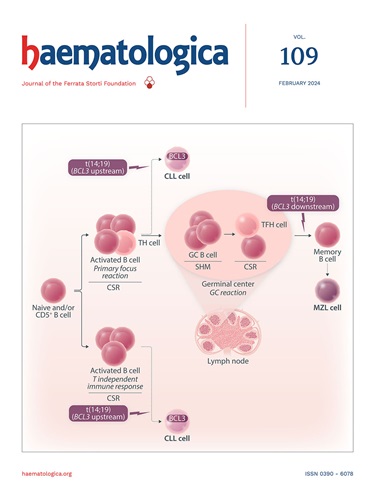What's hidden in plain sight? Impact of clonal hematopoiesis on the risk and progression of non-hematologic cancers.
IF 7.9
1区 医学
Q1 HEMATOLOGY
引用次数: 0
Abstract
Clonal hematopoiesis (CH) is a frequently observed phenomenon in aging individuals without apparent illness and exhibits an increased prevalence in cancer patients. Mechanistic studies indicate that mutant immune cells alter the tumor microenvironment, leading to increased inflammation, blood vessel formation, and immune cell exhaustion. Paradoxically, these changes also preserve stem-like T-cell pools that can be utilized by immunotherapy. CH may be incidentally detected in patients whose solid tumors are profiled by next-generation sequencing. Clinically, CH confers higher risks of therapy-related myeloid neoplasms, cardiovascular and inflammatory toxicities, and context-specific changes in treatment efficacy. Moreover, tumorinfiltrating CH independently shortens survival. Two validated risk scores can inform the risk for myeloid malignancy, yet surveillance, cardiometabolic management, and regimen selection still primarily rely on expert consensus. Because CH may be discovered incidentally, rigorous confirmation of variant origin when CH is suspected is essential to avoid misdirected therapy. We propose a pragmatic approach: confirm CH with paired blood sequencing when feasible; integrate high-risk features into risk stratification, counseling, and monitoring for cytopenias and cardiovascular events; and prefer less genotoxic regimens when the oncologic benefit is comparable. Early trials blocking interleukin-1β suggest that targeting inflammation driven by CH may improve outcomes in patients with solid tumors. Prospective studies informed by mutation analysis and tracking clonal changes and inflammatory markers are needed to determine if routine CH assessment can be integrated into precision oncology to improve outcomes for patients with solid tumors and CH.什么隐藏在显而易见的地方?克隆造血对非血液学癌症风险和进展的影响。
克隆造血(CH)是一种在没有明显疾病的老年人中经常观察到的现象,并且在癌症患者中表现出增加的患病率。机制研究表明,突变免疫细胞改变肿瘤微环境,导致炎症增加、血管形成和免疫细胞衰竭。矛盾的是,这些变化也保留了可用于免疫治疗的干细胞样t细胞池。在通过下一代测序分析实体瘤的患者中可能偶然检测到CH。在临床上,CH具有更高的治疗相关髓系肿瘤、心血管和炎症毒性的风险,以及治疗效果的具体情况变化。此外,肿瘤浸润CH单独缩短生存期。两个经过验证的风险评分可以告知髓系恶性肿瘤的风险,但监测、心脏代谢管理和方案选择仍然主要依赖于专家共识。由于CH可能是偶然发现的,因此当怀疑CH时,严格确认变异来源对于避免误导治疗至关重要。我们提出了一种实用的方法:在可行的情况下,通过配对血液测序来确认CH;将高危特征整合到细胞减少和心血管事件的风险分层、咨询和监测中;并且在肿瘤效益可比的情况下,更倾向于基因毒性较小的方案。早期试验表明,阻断白细胞介素-1β可能改善实体瘤患者的预后。需要通过突变分析、跟踪克隆变化和炎症标志物进行前瞻性研究,以确定常规的CH评估是否可以整合到精确肿瘤学中,以改善实体瘤和CH患者的预后。
本文章由计算机程序翻译,如有差异,请以英文原文为准。
求助全文
约1分钟内获得全文
求助全文
来源期刊

Haematologica
医学-血液学
CiteScore
14.10
自引率
2.00%
发文量
349
审稿时长
3-6 weeks
期刊介绍:
Haematologica is a journal that publishes articles within the broad field of hematology. It reports on novel findings in basic, clinical, and translational research.
Scope:
The scope of the journal includes reporting novel research results that:
Have a significant impact on understanding normal hematology or the development of hematological diseases.
Are likely to bring important changes to the diagnosis or treatment of hematological diseases.
 求助内容:
求助内容: 应助结果提醒方式:
应助结果提醒方式:


